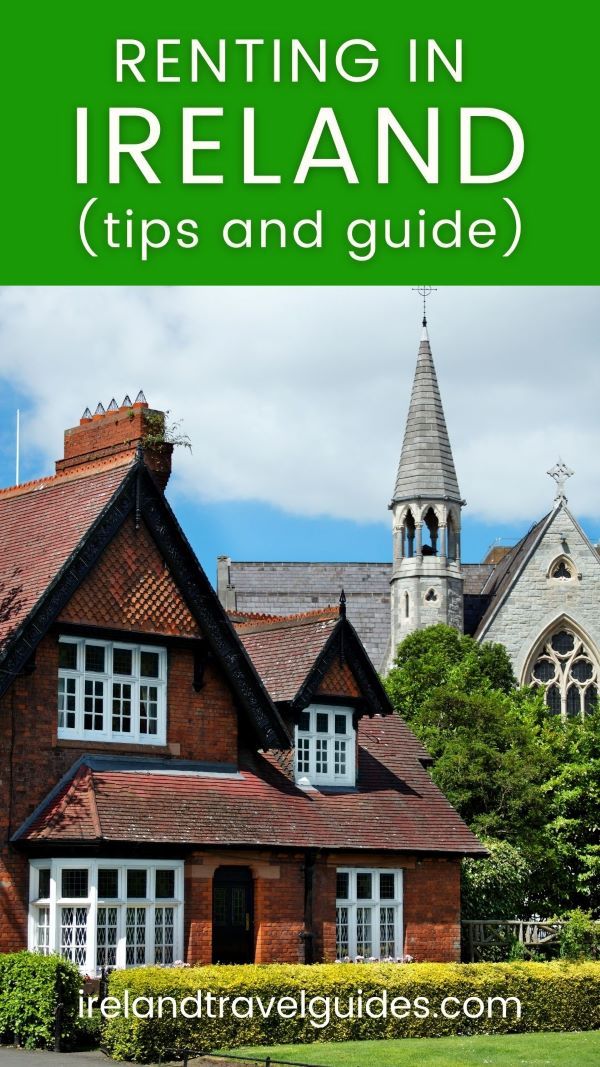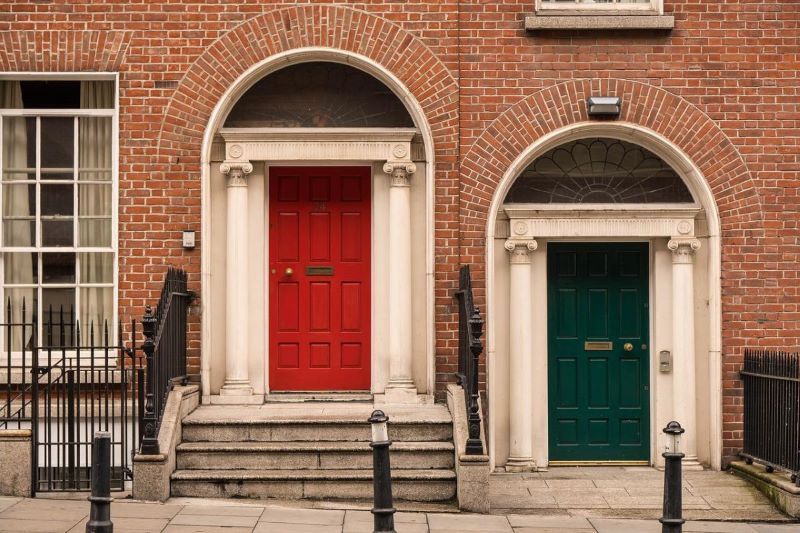Renting in Dublin? Here are some things to keep in mind, from how to find the best places to stay to what paperwork you’ll need.
Over the decades, Ireland has slowly and surely emerged not only as a beautiful tourist destination but also. one of the best places in the world to live and work.
Getting a place to call home in Ireland is the next step after landing a job here. If you’re planning to move to Ireland’s capital city of Dublin, this guide will tell you what you’ll need to know about the housing market and settling in there.
Housing in Ireland, like many popular expat locations, is on the pricey side. There is a housing scarcity in many Irish cities, however, it is not as serious as it is in other European capitals like Stockholm. For foreigners migrating to the Emerald Isle, short-term rentals are preferable to long-term rentals in Dublin since they give them time to search through the competitive market.
RELATED READ: Living In Dublin: The Ultimate Guide For Expats
If you find a rental home or apartment that you want, you’ll need to move quickly. You may not be able to discover a place you like a day later because of the limited supply of housing. The same is true for houses; however, if you want to find a truly diverse selection, venture outside of Dublin’s city center or a little further from public transportation.
Refer to this guide whether you’re looking to rent a single room or an entire apartment in Ireland.
Things you'll find in this article
Renting In Dublin – Guide For Newcomers

Related Read:
- Is Dublin Expensive? What You Need To Know (2023)
- Where To Stay in Dublin, Ireland
- 30 Best Things To Do In Dublin, Ireland (For 2023)
- 11 Must-See Castles In Dublin, Ireland
- Top 10 Gardens and Parks in Dublin To Visit
- 12 Best Bookstores in Dublin
Housing in Dublin
There are a wide variety of rental options available, including houses, apartments, and house shares. Dublin (and other cities in Ireland) has a big population of single individuals, and many of them choose to rent a private bedroom in a shared house rather than live in a hotel or expensive flat.
As a general rule, city rents and housing prices are more expensive than those in the suburbs. Despite the fact that rent in Dublin is more expensive than in other regions of the country, the city also boasts the most amenities and the easiest access to work, in addition to an efficient transportation system.
A more competitive housing market can be found in larger cities and towns. Make inquiries and set up viewings ahead of time to take advantage of the first-come, first-served policy.
Here are a few things to keep in mind if you’re looking to rent a property in Dublin
Lease Contract
Both you and the property owner sign a legally binding contract known as a tenancy agreement (or lease). Here, the details of the lease are laid out, including the amount of rent, the length of the contract, and what will happen if the terms are not adhered to. A six- or twelve-month lease is the most common duration.
Bills
Paid services for electricity, gas or oil, internet, phone, water, and trash disposal are among the most common types of bills to consider as you start renting. Check to see if your rent includes any expenses.
In Ireland, there are a variety of ways to pay your utility bills. This is to ensure that you won’t miss payments due to inaccessible funds. paying your monthly bills for utilities such as gas, electricity, water, and Internet, you have a few options. You can either use an online bill payment system, a bank account direct withdrawal, an ATM, or a Payzone sticker in a store.
Renting and Your Rights
If you’re a renter in Ireland, you must know your rights.
● For the next 24 months, your rent will not be increased.
The rent should not be higher than the market price.
● A security deposit is typically required when renting a property. A portion of this charge is refunded at the end of the lease, assuming no violations have occurred.
● Landlords have the right to withhold security deposits if the property is damaged, the contents are stolen, or unpaid debts are left.
● Due to “normal wear and tear,” deposits cannot be held for things like faded carpets or damaged paint.
How To Rent in Dublin
Is there a specific process for finding a nice rental property in the Dublin area? Here are a few things to keep in mind when considering certain rentals in Dublin:
How long can I rent an apartment in Dublin?
In Dublin, rental arrangements might range from a month-to-month agreement to a full one-year lease. Ireland does not have a specific rental law, so it is up to you to determine the best option for your situation.
Should I get a furnished or unfurnished rental in Dublin?
Apartments in Ireland can be found both furnished and unfurnished. As a result of its high influx of international residents, Dublin boasts the biggest number of furnished apartment options. Furnished apartments rarely require an additional security deposit, but if you damage any of the furnishings, you may not be able to get your money back.
What is the average rent in Dublin?
Depending on where you reside, the cost of renting a home in the country can vary greatly. In Dublin, a one-bedroom apartment costs, on average, €1,700 ($1,880). The average rental price for a family of four is €3,000 ($3,300) per month.
This figure includes monthly rents ranging from the most costly to the least expensive. If you’re a lone foreigner living abroad,
One of the most popular areas for expats in Dublin may be of interest to you.
Requirements for Renting in Dublin
You will be required to provide the following papers to secure a rental in Dublin:
● In order to prove your employment, you’ll need a reference from your employer, which includes their name, address, and phone number.
● a current or former landlord’s name, address, and phone number
● picture ID to verify your identity.
● To prove that you can afford the rent, you’ll need to provide your bank account information.
Short-Term Rentals in Dublin
There are several short-term rental options available in Dublin, as we discussed at the beginning of this guide. Keep in mind that the Irish real estate market is a highly competitive one. Temporary rentals allow you to weigh your options without feeling pressured into taking the first available place.
Short-term lease apartment searching is similar to long-term lease apartment searching. There are many options for monthly furnished rentals if you don’t want to bring everything with you at once.
Average Price of Short-Term Rentals
A long-term monthly rental in Ireland will cost around the same as a short-term one. Around 1,500 to 1,800 EUR is expected to be the average price in Dublin and the surrounding area (1,660 to 2,000 USD). There is a tendency for weekly rentals to cost more.
Requirements for Short-Term Rentals
If you want to rent a short-term apartment in Ireland, you’ll need a passport and an Irish visa, which will indicate how long you can stay in the country. It’s possible that you’ll need to show proof of income or employment while staying in a short-term lodging.
Websites to find rentals in Dublin
Over eighty-five percent of Ireland’s homes are listed on the internet. The websites listed below allow you to conduct a search based on location or transit route, as well as provide a comprehensive list of available lodging options. Even before you leave your native country, it is a good idea to research your possibilities online.
Short Term (Temporary Accommodation)
Short-term rentals are an excellent idea while you are looking for a long-term residence. There is less pressure and more time to look around and get a feel for the city’s neighborhoods and transportation options. Numerous websites focus solely on renting short-term properties.
There are a lot of options for short-term housing on these websites:
- Airbnb – offers vacation and short-term rentals to suit any budget. Read through descriptions, photos of the property, and reviews to ensure a good deal. Other similar sites to look at are:
- Dublin Shortlets
- Rent By Owner
- MyHome
Long Term Rentals in Dublin
In Dublin, the vast majority of apartments may be rented via the internet. Most expats’ go-to sites are listed below, and you can pick from a variety of them. If you’re looking to buy a home in Dublin, we recommend also joining a lot of Facebook groups and checking out online community notice boards in the region you’re interested in.
- daft.ie – Ireland’s top property website and app, and has established itself as the ‘go-to’ website/app for renters. Other similar sites to find long-term rentals are
- rent.ie
- myhome.ie
- rentola.ie
Tips When Renting in Dublin
The rental market in Ireland is pretty chaotic and is only going to get worse. As you begin your new life in Dublin, there are a few things to keep in mind when searching for a rental home.
1. Show up ready and be swift in making a decision if you like what you see at viewings. Make sure you have all the paperwork you’ll need in an envelope, such as references from your landlord and a copy of your IDs.
Bringing them along gives the impression that you’re well-prepared and know what you’re doing, even if they may want extra information provided to them by email.
2. Take the time to get to know the agent or person doing the viewing and go beyond the standard chit-chat about how wonderful the location is. Make a list of questions you want to ask before you arrive.
3. To ensure that you don’t miss anything, bring a second set of eyes to your viewings if possible. This may be another expat, a new neighbor or acquaintance, or even a coworker.
4. Keep an open mind. Many tenants start with a dream location in mind, but it can be pricey to be bound to one or two communities. Why not go somewhere you haven’t been before during a weekend and have a wander around?
There is a distinct north/south division in Dublin. By looking north of the Liffey, you can save money in the long run.
5. Prepare everything—if you receive “the nod,” be ready to provide anything they need.
You’ll be asked for the following information while looking at a rental in Dublin:
- Reference from your Employee
- Financial statements, bank details, or any proof that you can pay rent
- Reference from a former landlord (like in your home country, if applicable)
- Photo ID ( passport or driving license)
- PPS number
- First month’s rent and one-month deposit
6. Reading the contract multiple times is a must, as this is a binding agreement. You need to know exactly what you’re getting yourself into, especially if the room. or flat will be your home for the next month or so.
7. Make sure that the property is registered with the Residential Tenancy Board before you rent it. This is important because when it comes time to file taxes and show proof of residency, not having the property registered can cause issues.

Hi, I’m Christine – a full-time traveler and career woman. Although I’m from the Philippines, my location independent career took me to over 60 countries for the past 12 years. I also lived in 4 continents – from the Caribbean, South East Asia, Africa and now in Europe. But despite living in several countries, my love for Ireland remains the same. A country that had been a part of my life since I was 14 because of my love for Irish music and bands. Ireland Travel Guides was born because of this passion and hopefully, in some little ways, this website will be able to help you on your next trip to Ireland.


